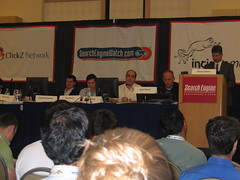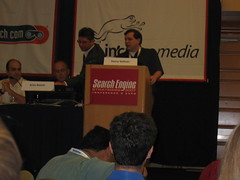In 1981 when legendary Minneapolis agency Fallon first opened their doors, a full page ad was run in the Star Tribune, Minneapolis’ primary daily, alerting the local business denizens that a new ad agency was promising to help them outsmart the competition, rather than outspend them. The concept of quality score as it relates to PPC ads always reminds me of this anecdote from the traditional ad world.
Quality score, as covered by Danny Sullivan and his esteemed panel at the session “Ads In A Quality Score World” is the bold idea that an ad’s success should be dependent on whether it produces content relevant to that which it promotes. In other words, a firm should not have to outspend its competition to be successful if it’s simply bright enough to ensure their ad speaks directly to its target’s expectations.
Sullivan’s panel was made up of experts from the field, including:
- Andrew Goodman, Principal, Page Zero Media
- Jonathan Mendez, Founder & Chief Strategy Officer from OTTO
- Brian Boland, Group Marketing Manager, Microsoft AdCenter
- David Pann, Vice President of Marketplace Design & Matching, Yahoo!
- Clay Bavor, Product Manager, Google
- Brad Geddes, Director of Search, LocalLaunch
So what did this dream team of a panel suggest in terms of ensuring a successful quality score, and thus, PPC campaign?
Quite simply, I feel Mendez put it best when he advised us to begin by ignoring the quality score. Quality score, as a concept, was launched in 2005. While relevancy is as old as marketing itself, automating relevancy can fall into the gray area known as “so simple it’s incredibly complex”. In other words, the experts themselves are constantly coping with how to ensure a search bot defines a concept that comes ingrained in most humans.
Would you believe that Mendez suggests we begin by marketing creatively? By focusing on what is known, rather than unknown (such as proven methods for drafting ad copy that will ensure a strong click through rate, and landing page copy that will ensure a strong conversion rate), and to trust these proven tactics will assuredly lead to a strong quality score?
If quality score is sure to follow a creative approach, how do we harness not only the creative powers within us as ad writers, but also the intuitive skills within us, to predict the unknown, as search engine marketers?
We do the same thing we do any other time we don’t know the exact answer. We test. Yahoo!’s David Pann pointed out the number one mistake in most PPC ads is poor keyword selection. The number one solution is to test, test and test again.
While testing should always be conducted, it will ultimately, and always, lead us back to relevancy.
While the rules of SEO may change daily – the simple objective of search will not. For example, when one is looking for a plumber, they don’t want a free ipod. When one is looking for movie showtimes, they don’t want ringtones. And when they’re looking for a date, they don’t want a webcam courtesy of Tiffani.
What quality score does is ensure that one part of our world works exactly the way it should. What we seek will provide us relevant results. The little guy will not just survive, but thrive, via intelligence, creative and transparency.
While automating a fairly subjective human notion such as relevancy will always produce the occasional gray area, as well as more work to discover and cope with these gray areas for us search engine marketers, the promise of quality score’s utopian vision makes every moment discovering its intricacies worth the extra effort.




